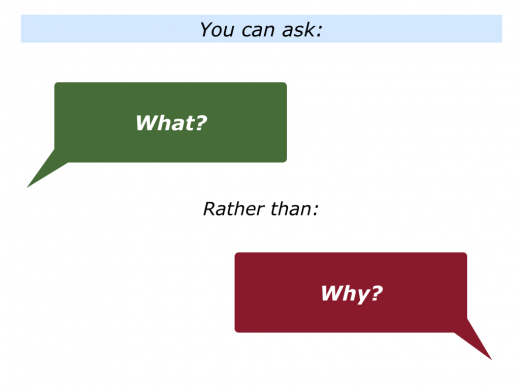This is a slightly controversial piece. The reason I have written it is because I have seen the negative effects of parents, teachers and others asking critical ‘Why?’ questions.
Certainly it is possible to ask tough questions in a caring way. When in doubt, however, it can often be more encouraging to use ‘What?’ rather than ‘Why?’
This is more likely to enable a person to achieve their picture of success.
Background
“Be careful when you ask ‘Why?’ questions,” said one therapist when I was studying psychotherapy.
“Because of their previous experience with such questions, a person may feel attacked or not be able to fully answer.
“There may be many reasons why, for example, a person behaves in a self defeating way.
“They may have had poor models in the childhood, failed to learn particular skills or whatever.
“Certainly it can be useful with such insights, but there are other ways to help them to gain this understanding.
“The point of asking questions is to enable a person to open up, explore and find answers. It is not to make them feel intimidated.
“Even if a client discovers ‘Why’ they behave in a certain way, they must then still move towards changing their behaviour.
“So you may want to consider another approach. People are more likely to open up if you create an encouraging environment and then ask certain kinds of ‘What?’ questions.
“Imagine that you want to help a client to alter their self defeating behaviour.
First, you can clarify the real results they
want to achieve – their picture of success.
“The client may be trying to fulfil some of their basic needs – such as wanting to be loved, happy and successful.
“But unfortunately they behave in a way that pushes away the very things they want.
“So you can ask questions such as: ‘What are the results you want to achieve?’
Second, you can offer positive models and practical
tools they can use to achieve their picture of success.
“Such an approach is more likely to be successful than coming across as a critic by asking: ‘Why do you do that?’
“Sometimes you can help a person to move forward by asking ‘What?’ rather than ‘Why?’”
The therapist’s views highlighted why people clammed up when asked to explain their behaviour.
Certainly somebody could benefit from understanding the reasons for their actions, but there were other methods for gaining such insights. The aim was to expand a person’s repertoire of tools for achieving success, rather than forever analysing failure.
Recognising the consequences of
sometimes asking a ‘Why?’ question
Some people get worried when asked a ‘Why?’ question. Much depends, of course, on how the question is asked.
Sometimes it can come across as caring, but other times it is interpreted as critical. One person said:
“When people keep asking ‘Why?’ it is as if an electrical charge goes across my brain.”
Obviously it can be useful to understand a person’s rationale for behaving in a certain way or putting forward a suggestion. But there are other ways of uncovering a person’s motives.
One approach is to ask open questions that may encourage the person to share their reasons. This approach can be more productive than asking closed questions that demand one correct answer
Asking ‘What?’ questions to
help the person to succeed
Imagine you are a counsellor, therapist or coach. Your role is to help people to achieve their picture of success.
Each person may come to you with both successful and self defeating patterns. How can you help them to reach their goals?
One approach is to ask ‘What?’ questions; another is to ask ‘Why?’ questions.
Below I have listed many more in the first category. Some of these ‘What?’ questions may actually help a person to uncover the reasons ‘Why?’ they behave in a certain way. Some also lead to asking ‘How?’ the person wants to implement their chosen action plan.
Here are the two types of questions you might ask somebody when they come for a session.
What would you like to get from the sessions? What are your specific goals? What would you like to achieve in your life and work?
Bearing these aims in mind, what topics would you like to explore in the sessions? What specific things – tools, ideas, knowledge – would you like to take away? What for you would make the sessions successful?”
Looking at the first topic you want to explore, let’s focus on a real life situation. What are your specific goals in this situation? What are the real results you want to achieve? What is your picture of success?
When have you faced a similar challenge in the past and managed it successfully? What did you do right then?
How can you follow some of these principles to tackle the present challenge? What other skills, tools or ideas would you like to learn to improve your chances of success?
Let’s return to the goal you want to achieve. What will be the benefits – both for you and other people – of achieving the goals?
What are the key strategies you can follow to give yourself the greatest chance of success?
How can you translate those strategies into action? How can you encourage yourself on the journey? How can you get some quick successes?
Why would you like to take part in the sessions? Why do you think you have these problems? Why do you think you don’t achieve your goals at the moment?
Why do you feel or behave the way you do? Why do you get into difficulties in, for example, relationships or work?
Why don’t you change your behaviour to reach your goals?
You will, of course, create your own repertoire of questions for helping a person to reach their goals.
Certainly it can be possible to ask a ‘Why?’ question that enables a person to move forward. But such questions have to be asked carefully.
It is also good to watch the person and see how they react. Do they open up or close down?
Building on what works, you can then expand your repertoire of questions that enable a person to succeed.
Giving somebody positive alternatives about
‘What’ you would like them to do in the future,
rather than asking: “Why do you do that?”
During the 1970s I spent several years working with family therapy. One pattern that emerged was that members of healthy families were often fair fighters.
Healthy parents encouraged their children. They also gave them clear messages – rather than confused messages or conflicting messages.
Everybody knew the ‘family rules’, which were geared to helping people to grow. When the parents had to draw a line with their children, however, they frequently gave the youngsters a positive alternative.
Certainly they expressed their feelings, but they also explained ‘What’ they would like the children to do in the future. The children therefore knew the specific behaviour that would – and would not – be rewarded.
Troubled families often indulged in dirty fighting. The parents fell into arguments and criticised other family members, demanding: “Why do you do that?” Everybody felt blamed and there was no place to go.
Fair Fighters
Fair fighters offer people a positive way forward. They start by taking responsibility for their own behaviour.
When encountering challenges, for example, they try to find creative solutions. They keep focusing on: “How can we solve it?”
When encountering conflicts, they aim to clarify what each person wants. They then use ‘How?’ questions, such as: “How can we, as far as possible, find a win-win?”
Dirty fighters focus on how others are to blame. Their relationships often end up as win-lose or, more likely, lose-lose.
People can take the first step towards developing a more virtuous circle by communicating ‘What’ they would like the other person to do in the future.
This won’t work straight away, maybe because there may be too much pain in the relationship. But it does give the possibility of considering a positive way forward.
Coaches Who Use ‘What?’
Rather Than ‘Why?’
Good coaches in sport follow certain rules when helping an athlete, for example, to look back on their performance.
They often ask the athlete to be the first to evaluate their performance.
They often use ‘What?’ questions rather than ‘Why?’ questions.
I saw this illustrated several years ago when a television crew were filming a promising young woman athlete. She had an encouraging coach, but extremely critical parents.
The athlete was used to winning. In one of the races the crew filmed, however, she finished in second place.
The cameras caught her parents being angry. They shouted things like:
“Why did she do that? Why didn’t she win? Why did she do X rather than Y?”
The coach moved between the parents and the athlete. Creating a sense of calm, he led the athlete to a place where she could recover.
After a while the coach invited the athlete to reflect over the weekend. He invited her to do the following homework that they would explore the next time they met.
Looking at the race – including the way she prepared and then ran the race – he asked her to describe the following things.
What I did well
The specific things I did well were:
*
*
*
The specific ways I can do more
of these things in the future are:
*
*
*
What I could do better
The specific things I could
do better next time are:
*
*
*
The specific ways I can do
these things in the future are:
*
*
*
The coach helped the athlete to develop the habit of continuous improvement. He did this in an encouraging way – inviting her to explore and formulate her own answers.
During the follow up session he also, when appropriate, shared his suggestions. The athlete built on her own ideas – plus took his advice on board – and continued to improve her performance.
As I said at the beginning, this may be a slightly controversial piece. As ever, however, take the best and leave the rest. Use the ideas you like to help other people to achieve success.




